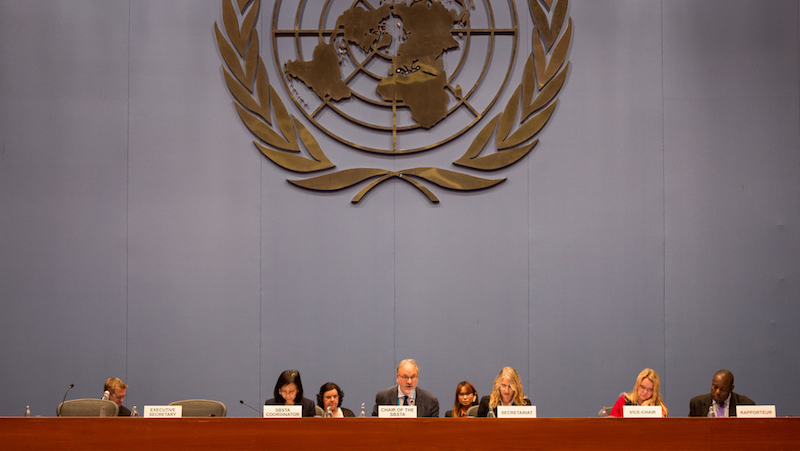An early start has been called for climate talks in Poland in December, with negotiators facing a huge task to write the rules for the Paris deal.
The UN climate chief Patricia Espinosa wrote to governments on Thursday to let them know that the Katowice COP24 would start a day earlier than scheduled – on 2 December.
“An early opening of the session will provide an opportunity to make the best use of the time available to finalize negotiations,” said Espinosa.
Espinosa’s deputy Ovais Sarmad told CHN the Sunday start would make room for a meeting of heads of state on the Monday, but not allow that to eat into negotiating time. He said it did not indicate talks in Bangkok were running behind.
The decision was taken in consultation with the Polish hosts.
Just do it
If you want talk, put 195 national negotiators in a room. If you want a website built, ask a youth delegate.
As countries fought over whether to have one online registry or two for national carbon-cutting and climate adaptation plans, Jonas Haller went ahead and created a webpage with all the technical features they had asked for and more.
It took about 40 hours to set up. At a rate of $100/hr, that’s $4,000. UNFCCC sessions are estimated to cost $100,000/hr, it says on the site, concluding: “It is a no-brainer to no longer waste a minute of talk on the registry in the negotiation halls.” You’ve been told.
Text watch
There is a draft decision text out on how to report climate finance, incorporating options proposed by G77 + China and the US, Australia and Japan. The outcome is still to play for, but it clarifies the political choices to be made.
The new #climatefinance proposal (at the UN #climate talks) could potentially lead to billions USD in increased support, OR it could water down existing commitments, leading to less action #SB48Bangkok
— Mattias Söderberg (@Mattias_S) September 6, 2018
Daily badges
Katowice has been billed as the most important UN climate summit since Paris in 2015, but that won’t be reflected in the delegate numbers.
The top Polish official, Michał Kurtyka, briefed observers on Wednesday that there would be capacity for 20-25,000 people. That’s less than half the number in Paris and a third less than last year’s talks in Bonn, reports Climate Tracker.
To manage the squeeze, the presidency is considering issuing day passes.
1.5C carbon budget
One of the key findings in an upcoming report from the UN science panel (IPCC) is worrying climate spin doctors in Bangkok.
The IPCC will publish a special report in October on the tougher 1.5C temperature target, which will set the tone for Katowice.
A key question is: what level of emissions will tip the world over the 1.5C threshold? There is a range of estimates of that “carbon budget” and the judgement of which to foreground has big political implications. As Climate Home News reported, that choice changed between the first and second drafts, with no explanation.
If the scientists pick a low number, it kills vulnerable communities’ hopes of staying within the safer limit. If they go high, it implies the 2C outer edge of ambition is achievable without further effort – not an easy message.
Big guns
Only heads of state can break the cycle of broken promises at climate talks, former executive secretary of the UNFCCC Yvo de Boer writes in CHN.
Rio, Kyoto, Paris… they all relied on a vanishing resource: trust. He says climate action is faltering because of “the perception that rich nations have not met their ‘obligations’”
“We cannot build a tower of ambition on a bedrock of broken promises,” he says, and outlines his views on what needs to be done for trust to be rebuilt.
(Also, find out which country’s negotiator ripped up the outcome at Cop14 in Poznan and threw it in the bin…).
More pushback on markets
Negotiators for the South America and Caribbean Alba group are not the only ones to oppose market approaches for cutting down emissions. In an op-ed for CHN released on Wednesday, several NGOs vociferously call out carbon trading as ‘a recipe for climate disaster’ and a contemporary expression of neo-colonialism.
On the outside
- Pacific nations convinced their biggest regional partner Australia to sign up to a declaration that climate change was the “single greatest” threat to security in the region.
- Writing in the Bangkok Post, Greenpeace South East Asia director Yeb Sano and former Philippines negotiator slammed the pledges of the Paris Agreement signatories as falling ‘far short of what is needed’. Sano singled out Thailand’s pledge to cut 20-25% cut in greenhouse gas emissions by 2030 as unimpressive.
- Aussies love their coal. A new report by Australian academics, however, points out that market forces alone could see the country’s coal use fall sharply in the 2030s.
- Australia tried to dilute a resolution agreed by country representatives at the Pacific Island Forum on Wednesday, backing away, among others, from calling the USA to return to the Paris Agreement, the Guardian reports.
Additional reporting by Helga Timaroczky.
